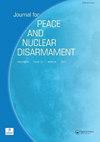Strategic Stability in the 21st Century: An Introduction
IF 1.4
Q4 INTERNATIONAL RELATIONS
引用次数: 0
Abstract
ABSTRACT The concept of strategic stability has come under immense pressure in recent years. It is not only conceptually fuzzy but nuclear multipolarity, novel technologies, an exacerbating crisis in arms control, and a growing acceptance of “softer” norms are all taking a toll. At the same time, nuclear weapon states are concerned with possible instability to a degree not seen since the most severe crises of the Cold War. This special issue seeks to clarify some of the profound challenges to strategic stability while also offering novel scholarly as well as policy-relevant approaches to better understanding and mitigating the risks of instability. The three articles and one commentary focus on the US-Russian dyad and pragmatic efforts to clarify the goals and means of strategic stability between Moscow and Washington; the impact of emerging technologies in Russia’s war against Ukraine; US and Russian leaders’ perceptions of artificial intelligence as a novel and threatening capability of competition; and possible US efforts to initiate an arms control dialogue with China by early discussions on crisis management.21世纪的战略稳定:导论
摘要近年来,战略稳定的概念受到了巨大的压力。这不仅在概念上是模糊的,而且核多极、新技术、军备控制危机的加剧以及对“更软”规范的日益接受都在造成损失。与此同时,核武器国家对可能出现的不稳定感到担忧,这种不稳定程度是冷战最严重危机以来从未见过的。本期特刊旨在澄清战略稳定面临的一些深刻挑战,同时提供新颖的学术和政策相关方法,以更好地理解和减轻不稳定的风险。这三篇文章和一篇评论聚焦于美俄关系以及为澄清莫斯科和华盛顿之间战略稳定的目标和手段所做的务实努力;俄罗斯对乌克兰战争中新兴技术的影响;美国和俄罗斯领导人将人工智能视为一种新颖且具有威胁性的竞争能力;以及美国可能通过尽早讨论危机管理问题来启动与中国的军备控制对话。
本文章由计算机程序翻译,如有差异,请以英文原文为准。
求助全文
约1分钟内获得全文
求助全文
来源期刊

Journal for Peace and Nuclear Disarmament
INTERNATIONAL RELATIONS-
CiteScore
1.30
自引率
0.00%
发文量
36
审稿时长
12 weeks
 求助内容:
求助内容: 应助结果提醒方式:
应助结果提醒方式:


